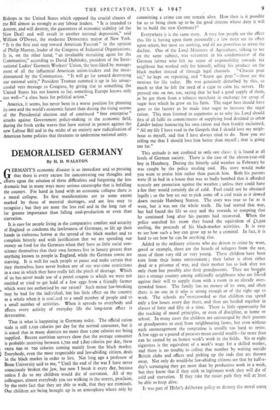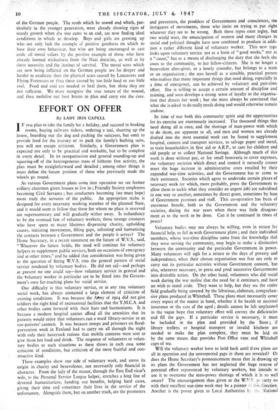DEMORALISED GERMANY
By H. D. WALSTON
GERMANY'S economic disaster is so immediate and so pressing that there is every excuse for concentrating our thoughts and efforts upon the solution of these difficulties and forgetting the less dramatic but in many ways more serious catastrophe that is befalling the country. For hand in hand with an economic collapse there is a moral collapse. Its first manifestations are to some extent marked by those of material shortages, and are less easy to recognise ; but they are none the less real and in the long run of far greater importance than falling coal-production or even than starvation.
It is easy for people living in the comparative comfort and security of England to condemn the lawlessness of Germany, to lift up their hands in righteous horror at the spread of the black market and to complain bitterly and with justification that we are spending our money on food for the Germans when they have so little social con- science themselves that their own farmers live in luxury greater than anything known to people in England, while the German towns are starving. It is well for such people to pause and make certain that they themselves have never broken any of our war-time restrictions in a case in which they have really felt the pinch of shortage. Which of us has never made use of a petrol coupon to which we were not entitled or tried to get hold of a few eggs from a friendly farmer which were not authorised by our ration? Such minor law-breaking may be bad for the individual, bin has little effect on the country as a whole when it is conLned to a small number of people and to a small number of activities. When it spreads to everybody and affects every activity of everyday life the long-term effect is devastating.
That is what is happening in Germany today. The official ration scale is still x,55o calories per day for the normal consumer, but it is stated that in many districts no more than r,000 calories are being supplied. Recent nutrition surveys show that the average consumer is probably receiving between I,7oo and 1,80o calories per day, these extra boo or 700 calories coming mainly from the black market. Everybody, even the most respectable and law-abiding citizen, deals in the black market in order to live. Not long ago a professor of Bonn University said to me, "Until the end of the war I have never consciously broken the Jaw, but now I break it every day, because
unless I do so my children would die of starvation. All of my colleagues, almost everybody you see walking in the streets, proclaim, by the mere fact that they are able to walk, that they are criminals. Our children are being brought up in an atmosphere where only by committing a crime can one remain alive. How then is it possible for us to bring them up to be the .good citizens whose duty it will be to build the new Germany?"
Everywhere it is the same story. A very few people see the effect this life is having upon them personally ; a few more see its effect upon others, but most see nothing, and all are powerless to arrest the decline. One of the Land Ministers of Agriculture, talking to me on the same subject, was vehement in his condemnatior of the German farmer who felt no sense of responsibility towards his neighbour but worked only for himself, selling his produce on the black market instead of through legal channels. " Chacun pour soi," he kept on repeating, and " Sauve qui pent "—those are the mottoes for life today. He was genuinely disturbed by this, so much so that he felt the need of a cigar to calm his nerves. He pressed one on me, too, saying that he had a good supply of them, as he got them from a tobacco merchant in exchange for syrup of sugar beet which he grew on his farm. The sugar beet should have gone to the factory to be made into sugar to increase the sugar ration. This man listened to arguments as to why his Land should first of all fulfil its commitments of supplying food destined to other Lander before honouring his own ration and then frankly exclaimed, " All my life I have read in the Gospels that I should love my neigh- bour as myself, and that I have always tried to do. Now you are telling me that I should love him better than myself ; that is going too far."
This attitude is not confined to only one class: it is found at all levels of German society. There is the case of the eleven-year-old boy in Hamburg. During the bitterly cold weather in February he was caught by the police stealing coal. His story would make you want to praise him rather than punish him. Both his parents were ill in bed in a house that was so badly bombed that it afforded scarcely any protection against the weather ; unless they could have a fire they would certainly die of cold. Fuel could not be obtained legally ; so the boy set out to pick some off a coal train as it slowed down outside Hamburg Station. The story was true so far as it went, but it was not the whole truth. He had started that way, but had found the life so easy and the rewards so tempting that he continued long after his parents had recovered. When the police searched his room they found the equivalent of D,5oo sterling, the proceeds of his black-market activities. It is easy to see how such a boy can grow up to be a criminal. In fact, it is hard to see how he can be anything else.
Added to the ordinary citizens who are driven to crime by want, greed or example, there are the hoards of refugees from the east, most of them very old or very young. These children have been torn from their home environment ; their father is often either dead or a prisoner of war, and their mother has to look after not only them but possibly also their grandparents. They are brought into a strange country among unfriendly neighbours who are forced against their will to supply them with a room in an already over- crowded house. The family has no money of its own, and often there is no one in it who is strong enough or of the right age to work. The schools are overcrowded so that children can spend only a few hours every day there, and then are herded together in classes of forty and fifty at a time. There is little opportunity for the teaching of moral principles, or even of discipline, at home or school. In many cases the children are encouraged by their parents or grandparents to steal from neighbouring farms, but even without such encouragement the temptation is usually too hard to resist. A few eggs or a pound of potatoes mean untold wealth—far more than can be earned by an honest week's work in the fields. Six or eight cigarettes is the equivalent of a week's wage for a skilled worker, and there is no trouble to collect that number by waiting outside British clubs and offices and picking up the ends that are thrown away. Not only do would-be law-abiding citizens see that by half-a- day's scrounging they get more than by productive work in a week, but they know that if they stick to legitimate work they will die of cold and starvation. If they take the easier path they will at least be able to keep alive.
It was part of Hitler's deliberate policy to destroy the moral sense,
of the German people. The seeds which he sowed and which, par- ticularly in the younger generation, were already showing signs of sturdy growth when the war came to an end, are now fording ideal conditions in which to develop. Boys and girls are growing up who not only lack the example of positive goodness On which to base their own behaviour, but who are being encouraged to cast aside all moral values by the positive example of those who have already learned wickedness from the Nazi doctrine, as well as by sheer necessity and the instinct of survival. The moral scars which are now being inflicted on the German people are far deeper and harder to eradicate than the physical scars caused by Lancasters and Flying Fortresses or than those caused by too little food. or too little coal. Food and coal are needed to heal them, but alone they are not sufficient. We must recognise the true nature of the wound, and then mobilise our best brains to plan and carry out the cure.







































 Previous page
Previous page